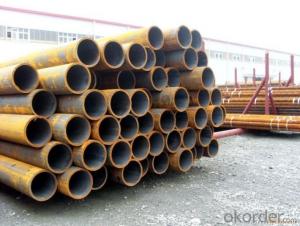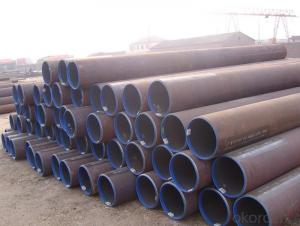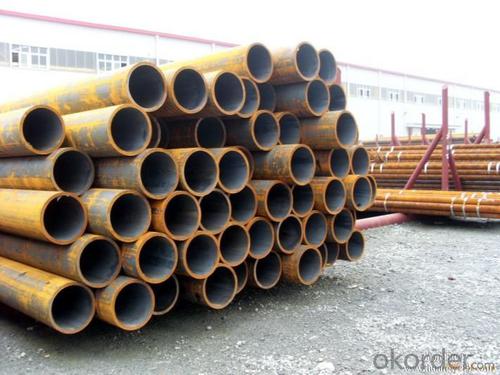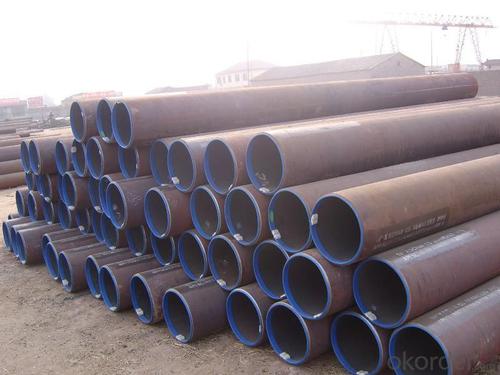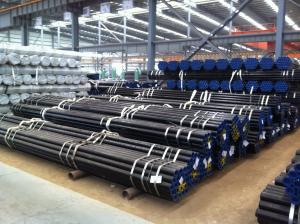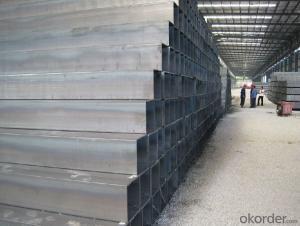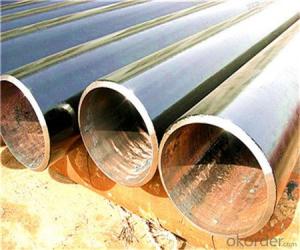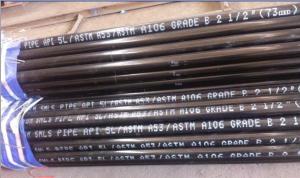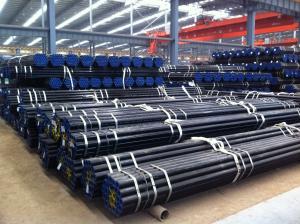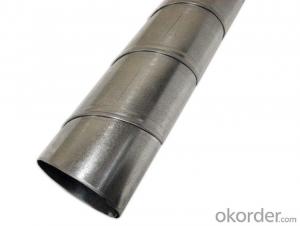Carbon Seamless Steel Pipe of API 5L For Structure Usage Hot Sale
- Loading Port:
- Tianjin
- Payment Terms:
- TT OR LC
- Min Order Qty:
- 25 m.t.
- Supply Capability:
- 10000 m.t./month
OKorder Service Pledge
OKorder Financial Service
You Might Also Like
Product Description:
1、Carbon Seamless Steel Pipe of API 5L For Structure Usage Hot Sale Description:
Seamless pipe is formed by drawing a solid billet over a piercing rod to create the hollow shell. As the manufacturing process does not include any welding, seamless pipes are perceived to be stronger and more reliable. Historically seamless pipe was regarded as withstanding pressure better than other types, and was often more easily available than welded pipe.
2、Main Features of Carbon Seamless Steel Pipe of API 5L For Structure Usage Hot Sale:
• High manufacturing accuracy
• High strength
• Small inertia resistance
• Strong heat dissipation ability
• Good visual effect
• Reasonable price
3、Carbon Seamless Steel Pipe of API 5L For Structure Usage Hot Sale Images:
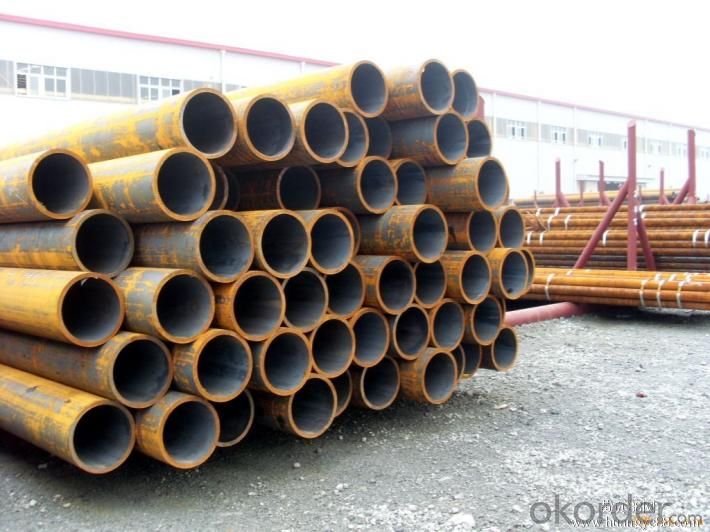
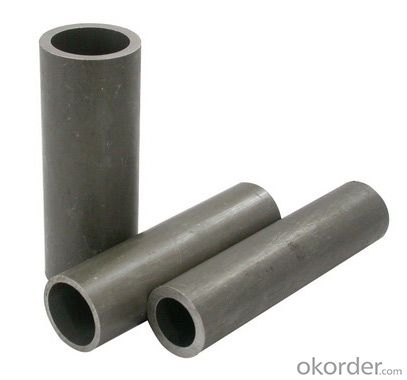
Packaging & Delivery
Packaging Details: | seaworthy package,bundles wrapped with strong steel strip |
Delivery Detail: | 15-30days after received 30%TT |
4、Carbon Seamless Steel Pipe of API 5L For Structure Usage Hot Sale Specification:
Standard | GB, DIN, ASTM |
Grade | 10#-45#, 16Mn |
Thickness | 8 - 33 mm |
Section Shape | Round |
Outer Diameter | 133 - 219 mm |
Place of Origin | Shandong, China (Mainland) |
Secondary Or Not | Non-secondary |
Application | Hydraulic Pipe |
Technique | Cold Drawn |
Certification | API |
Surface Treatment | factory state or painted black |
Special Pipe | API Pipe |
Alloy Or Not | Non-alloy |
Length | 5-12M |
Outer Diameter | 21.3-610mm |
Grade | 20#, 45#, Q345, API J55, API K55, API L80, API N80, API P110, A53B |
Standard | ASME, ASTM |
1.Material:20#(ASTM A 106/A53 GRB.API5LGRB,GB),45#,16Mn,10#.
2.Specification range:OD:21.3-610mm,WT:6-70mm,length:6-12m or according to the requirement of clients.
3.Excutive standards:GB,ASME API5L.ASTM A 106/A53,Despite of the above standards,we can also supply seamless steel pipe with standard of DIN,JIS,and so on,and also develop new products according to the requirements of our clients!
4.Surface:black lacquered,varnish coating or galvanized.
5.Ends:Beveled or square cut,plastic capped,painted.
6.Packing:bundles wrapped with strong steel strip,seaworthy packing.
5、FAQ of Carbon Seamless Steel Pipe of API 5L For Structure Usage Hot Sale:
①How is the quality of your products?
Our products are manufactured strictly according to national and internaional standard, and we take a test
on every pipe before delivered out. If you want see our quality certifications and all kinds of testing report, please just ask us for it.
Guaranteed: If products’ quality don’t accord to discription as we give or the promise before you place order, we promise 100% refund.
②How about price?
Yes, we are factory and be able to give you lowest price below market one, and we have a policy that “ for saving time and absolutely honest business attitude, we quote as lowest as possible for any customer, and discount can be given according to quantity”,if you like bargain and factory price is not low enough as you think, just don’t waste your time.Please trust the quotation we would give you, it is professional one.
③Why should you chose us?
Chose happens because of quality, then price, We can give you both.Additionally, we can also offer professional products inquiry, products knowledge train(for agents), smooth goods delivery, exellent customer solution proposals.Our service formula: good quality+good price+good service=customer’s trust
SGS test is available, customer inspection before shipping is welcome, third party inspection is no problem.
Any question, pls feel free to contact us !
- Q: What are the safety precautions to follow while working with steel pipes?
- When working with steel pipes, it is important to follow several safety precautions to ensure a safe working environment. These precautions include wearing appropriate personal protective equipment (PPE), such as gloves, steel-toed boots, and safety glasses, to protect against potential hazards. It is also crucial to inspect the pipes for any defects or damage before use to avoid accidents. Additionally, workers should be trained on proper handling and lifting techniques to prevent strains or injuries. Finally, it is essential to establish clear communication and adhere to safety protocols, such as using caution signs and barriers, to promote a safe work area for everyone involved.
- Q: What are the advantages of using steel pipes in irrigation systems?
- There are several advantages of using steel pipes in irrigation systems. First, steel pipes are highly durable and have a long lifespan, making them a cost-effective choice as they require less frequent replacement or maintenance. Additionally, steel pipes can withstand high pressures and temperatures, making them suitable for various irrigation applications. They are also resistant to corrosion, which ensures the quality and longevity of the irrigation system. Moreover, steel pipes have a smooth interior surface, minimizing friction and allowing for efficient water flow, resulting in improved irrigation performance.
- Q: What are the different testing methods for steel pipes?
- Some of the different testing methods for steel pipes include visual inspection, ultrasonic testing, magnetic particle testing, radiographic testing, and hydrostatic testing.
- Q: What is the difference between carbon steel and cast iron pipes?
- Carbon steel and cast iron pipes are both widely used in various industries for different applications. The main difference between these two types of pipes lies in their composition and properties. 1. Composition: Carbon steel pipes are primarily made of iron and carbon, with trace amounts of other elements such as manganese, phosphorus, and sulfur. On the other hand, cast iron pipes are made by melting iron and adding a small amount of carbon, usually between 2-4%. 2. Strength and Durability: Carbon steel pipes are generally stronger and more durable than cast iron pipes. Carbon steel has a higher tensile strength, which means it can withstand higher pressures and is less likely to be damaged or deformed. Cast iron, although strong, is more brittle and prone to cracking. 3. Corrosion Resistance: Carbon steel pipes require additional coatings or treatments to protect them from corrosion. Without proper protection, carbon steel pipes can be susceptible to rust and corrosion, especially when exposed to moisture or aggressive substances. On the other hand, cast iron pipes have inherent corrosion resistance due to the formation of a protective layer of iron oxide (rust) on their surface. 4. Weight and Installation: Cast iron pipes are typically heavier than carbon steel pipes, making them more challenging to handle and install. Carbon steel pipes are comparatively lighter, allowing for easier transportation and installation. 5. Noise and Vibration: Cast iron pipes have superior sound-deadening properties, making them quieter when fluids flow through them. On the contrary, carbon steel pipes tend to transmit more noise and vibrations. 6. Cost: Cast iron pipes are generally more expensive than carbon steel pipes due to the additional manufacturing processes and the higher cost of raw materials. In summary, the main differences between carbon steel and cast iron pipes lie in their composition, strength, corrosion resistance, weight, noise transmission, and cost. The choice between the two depends on the specific application, budget, and environmental factors.
- Q: What are the different methods of pipe insulation for steel pipes?
- There are several methods of pipe insulation for steel pipes, each with its own advantages and suitability for specific applications. Some of the commonly used methods include: 1. Fiberglass insulation: This is one of the most popular methods of pipe insulation. Fiberglass insulation is made of fine glass fibers and is available in various forms such as rolls, sheets, or pre-formed sections. It is lightweight, easy to install, and provides excellent thermal insulation properties. 2. Foam insulation: Foam insulation is another effective method for insulating steel pipes. It is available in different forms, including rigid foam boards or spray foam. Foam insulation is known for its high insulating value and its ability to seal gaps and cracks, providing enhanced energy efficiency. 3. Rubber insulation: Rubber insulation, commonly known as elastomeric insulation, is widely used for insulating steel pipes in HVAC systems. It is flexible, durable, and resistant to moisture, making it suitable for both indoor and outdoor applications. Rubber insulation also offers good thermal and acoustic insulation properties. 4. Polyethylene insulation: Polyethylene insulation is a cost-effective option for insulating steel pipes. It is available in different forms, such as foam tubes or molded sections, and is easy to install. Polyethylene insulation provides good thermal insulation, protects against condensation, and is resistant to water vapor diffusion. 5. Cellular glass insulation: Cellular glass insulation is a rigid insulation material made from crushed glass and a foaming agent. It is known for its exceptional thermal insulation properties, as well as its resistance to moisture, fire, and chemicals. Cellular glass insulation is commonly used in cryogenic and high-temperature applications. It is important to consider factors such as temperature, moisture conditions, and the specific requirements of the project when selecting the appropriate method of pipe insulation for steel pipes. Consulting with a professional or an insulation expert can help determine the best insulation method based on the specific needs and conditions of the project.
- Q: What is the difference between steel pipe and PVC pipe?
- Steel pipe and PVC pipe are both commonly used materials for plumbing and other construction applications, but they have several key differences. Firstly, the material itself is different. Steel pipe is made from steel, which is an alloy of iron and carbon. It is known for its strength and durability, making it suitable for high-pressure applications and underground installations. On the other hand, PVC (polyvinyl chloride) pipe is made from a type of plastic known as PVC. It is lightweight, flexible, and easy to handle, making it a popular choice for residential plumbing and irrigation systems. Secondly, the installation process differs. Steel pipe requires skilled labor and specialized tools for cutting, threading, and welding. It often involves a complex installation process, especially for larger pipe sizes. PVC pipe, on the other hand, can be easily cut with a saw or specialized pipe cutter and joined together using solvent cement or threaded fittings. This makes PVC pipe more suitable for do-it-yourself projects and simpler installations. Thirdly, steel pipe has a higher cost compared to PVC pipe. Steel is a more expensive material, and the manufacturing process for steel pipe is more complex, involving multiple steps and additional materials. PVC pipe, being made from plastic, is generally cheaper and more cost-effective, especially for smaller diameter applications. In terms of performance, steel pipe has higher tensile strength, can withstand higher pressure, and is more resistant to temperature changes, making it ideal for heavy-duty and industrial applications. PVC pipe, on the other hand, has a lower tensile strength but is resistant to corrosion, chemicals, and scale buildup. It is commonly used in residential plumbing, irrigation systems, and other non-industrial applications. In summary, the main differences between steel pipe and PVC pipe lie in the material, installation process, cost, and performance characteristics. While steel pipe is stronger and more suitable for heavy-duty applications, PVC pipe is lighter, easier to install, and more cost-effective for residential and non-industrial uses.
- Q: Can steel pipes be used for irrigation systems?
- Yes, steel pipes can be used for irrigation systems. They are strong, durable, and resistant to corrosion, making them suitable for transporting water and withstanding outdoor conditions. However, it is important to ensure proper insulation and maintenance to prevent any potential rust or degradation.
- Q: The difference between carbon and welded steel tubes
- Seamless steel pipe because there is no weld, so can withstand greater pressure, boiler tubes are generally used seamless steel pipe
- Q: How are steel pipes protected against internal corrosion?
- Steel pipes are protected against internal corrosion primarily through the use of protective coatings such as epoxy or polyethylene. These coatings act as a barrier, preventing contact between the steel surface and corrosive substances present in the transported fluids. Additionally, corrosion inhibitors are often added to the transported fluids to further reduce the likelihood of internal corrosion. Regular inspections and maintenance are also carried out to identify any potential corrosion issues and address them promptly.
- Q: What are the environmental impacts of steel pipe production and disposal?
- Significant environmental impacts are associated with the production and disposal of steel pipes. First and foremost, the production of steel pipes necessitates the extraction of raw materials such as iron ore, coal, and limestone. This extraction process leads to the destruction of habitats, deforestation, and soil erosion. Furthermore, mining and processing these materials require a substantial amount of energy, often derived from fossil fuels, which contributes to the emission of greenhouse gases and air pollution. The manufacturing process itself encompasses various stages, such as melting, casting, rolling, and coating, all of which demand considerable energy inputs and emit substantial quantities of carbon dioxide and other greenhouse gases. Additionally, the production of steel pipes involves the utilization of chemicals and additives that can pose harm to the environment if not properly managed. Moreover, if steel pipes are not recycled or appropriately dealt with during disposal, they can end up in landfills, thus contributing to waste accumulation and occupying valuable space. Steel is typically non-biodegradable and can take hundreds of years to decompose. When steel pipes are dumped in landfills, they can release toxic substances and heavy metals, which can contaminate soil and groundwater. Nevertheless, it is important to acknowledge that steel pipes are highly recyclable, and recycling them significantly mitigates the environmental impact. Recycling steel pipes aids in the conservation of natural resources, reduces energy consumption, and lowers greenhouse gas emissions. Additionally, using recycled steel in the production of new pipes requires less energy and results in fewer emissions compared to using virgin materials. To minimize the environmental impacts of steel pipe production and disposal, it is crucial to advocate sustainable practices throughout the entire lifecycle of the product. This entails reducing energy consumption, utilizing renewable energy sources, implementing proper waste management strategies, and encouraging the recycling and reuse of steel pipes.
Send your message to us
Carbon Seamless Steel Pipe of API 5L For Structure Usage Hot Sale
- Loading Port:
- Tianjin
- Payment Terms:
- TT OR LC
- Min Order Qty:
- 25 m.t.
- Supply Capability:
- 10000 m.t./month
OKorder Service Pledge
OKorder Financial Service
Similar products
Hot products
Hot Searches
Related keywords
